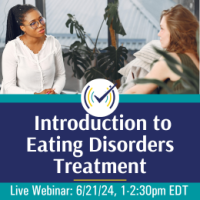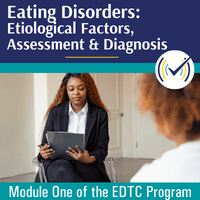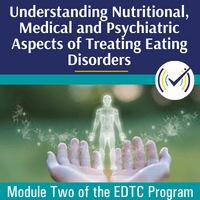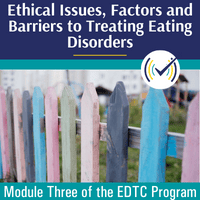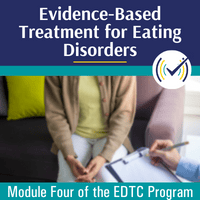This training program offers a bundle of four courses and the Eating Disorders Training Certificate (EDTC). The courses of the EDTC program offer clinicians comprehensive knowledge on the etiology, assessment and treatment of eating disorders. Exploration of risk factors for the development of eating disorders, including the ongoing impact of sociocultural influences will be discussed in this training. Instruction on how to assess for eating disorder symptomatology and severity, including differential diagnosis will be provided. This training will provide an overview of current research in the field with an emphasis on evidence-based treatment approaches for various eating disorders and populations. This training empowers clinicians with the knowledge and interventions to confidently treat clients with eating disorders, as well as resources for complex cases that require additional support.
Courses included with this registration:
- Eating Disorders: Etiological Factors, Assessment & Diagnosis, Online Self-Study
- Multidisciplinary Collaboration: Understanding Nutritional, Medical and Psychiatric Aspects of Treating Eating Disorders, Online Self-Study
- It’s Complicated: Ethical Issues, Maintaining Factors and Barriers to Treating Eating Disorders, Online Self-Study
- Evidence-Based Treatment Approaches for Eating Disorders, Online Self-Study
Enrollment in this 4-course bundle also includes the Eating Disorders Training Certificate, which is available to participants once coursework has been completed.
Instruction consists of 24 hours of video instruction and a post-test.
The Eating Disorder Training Certificate (EDTC) program requires completion of four courses:
- Eating Disorders: Etiological Factors, Assessment & Diagnosis
- Multidisciplinary Collaboration: Understanding Nutritional, Medical and Psychiatric Aspects of Treating Eating Disorders
- It’s Complicated: Ethical Issues, Maintaining Factors and Barriers to Treating Eating Disorders
- Evidence-Based Treatment Approaches for Eating Disorders
After participating in Eating Disorders: Etiological Factors, Assessment & Diagnosis
participants will be able to:
Identify the etiological factors that increase vulnerability for the development of eating disorders.
Recognize how to comprehensively assess and differentially diagnose a range of eating disorders and related conditions.
List the criteria for level of care appropriateness based on a comprehensive eating disorder assessment
After participating in Multidisciplinary Collaboration: Understanding Nutritional, Medical and Psychiatric Aspects of Treating Eating Disorders participants will be able to:
Implement strategies for collaborating with multidisciplinary professionals including nutrition, medical and psychiatric professionals.
List at least two medical complications that require ongoing monitoring in individuals with eating disorders.
Discuss two varied approaches to the nutritional treatment of eating disorders and be able to explain the benefits and challenges of each approach.
After participating in It’s Complicated: Ethical Issues, Maintaining Factors and Barriers to Treating Eating Disorders participants will be able to:
Identify the maintaining factors that inhibit treatment and recovery from eating disorders.
Discuss at least two sociocultural influences that impact the development and maintenance of eating disorders.
Apply an ethical decision-making model to the treatment of complex eating disorders.
After participating in Evidence-Based Treatment Approaches for Eating Disorders participants will be able to:
Discuss the key elements of family-based treatment for adolescents with eating disorders.
Explain the application of cognitive behavioral principles and strategies to the treatment of eating disorders.
Identify at least one evidence-based approach to the treatment of avoidant-restrictive food intake disorder (ARFID).
Melanie Smith, PhD, LMHC, CEDS-S
Melanie Smith, PhD, LMHC, CEDS-S, is the Director of Training for The Renfrew Center for Eating Disorders. In this role, she provides ongoing training, supervision and consultation to clinicians across disciplines for the purpose of continually assessing and improving competence in the treatment of eating disorders. Dr. Smith is co-author of The Renfrew Unified Treatment for Eating Disorders and Comorbidity Therapist Guide and Workbook (Oxford University Press), is a Certified Eating Disorders Specialist and Approved Supervisor, and is a Certified Therapist and Trainer for the Unified Protocol for the Transdiagnostic Treatment of Emotional Disorders (UP). In addition to her work with the Renfrew Center, Dr. Smith maintains a telehealth private practice specializing in the supervision and consultation of registered mental health counselor interns (Florida) and individuals seeking eating disorder specialist certification through the International Association of Eating Disorders Professionals (iaedp).
You can find more information about Dr. Smith here and the Renfrew Center here.
Credit Hours: This program consists of a total of 24 continuing education hours of credit (6 of which are ethics) upon completion of all four courses.
Counselors: Telehealth Certification Institute, LLC has been approved by NBCC as an Approved Continuing Education Provider, ACEP No, 6693. Programs that do not qualify for NBCC credit are clearly identified. Telehealth Certification Institute, LLC is solely responsible for all aspects of the programs.
Telehealth Certification Institute, LLC is recognized by the New York State Education Department's State Board for Mental Health Practitioners as an approved provider of continuing education for Licensed Mental Health Counselors. #MHC-0048.
Marriage and Family Therapists: Many MFT licensing boards accept our courses or one of the approvals which we have from professional associations. You can check with your board to determine if your licensing board would accept this course.
Social Workers: Telehealth Certification Institute LLC, #1609, is approved to offer social work continuing education by the Association of Social Work Boards (ASWB) Approved Continuing Education (ACE) program. Organizations, not individual courses, are approved as ACE providers. State and provincial regulatory boards have the final authority to determine whether an individual course may be accepted for continuing education credit. Telehealth Certification Institute LLC maintains responsibility for this course. ACE provider approval period: 05/02/2021 – 05/02/2024. Social workers completing this course receive 18 clinical continuing education credits and 6 ethics continuing education credits.
Telehealth Certification Institute, LLC is recognized by the New York State Education Department's State Board for Social Work as an approved provider of continuing education for Licensed Social Workers #SW-0435.
Addiction Professionals: This course has been approved by Telehealth Certification Institute LLC, as a NAADAC Approved Education Provider, for educational credits. NAADAC Provider #193104, Telehealth Certification Institute LLC is responsible for all aspects of the programing.
Psychologists: Telehealth Certification Institute LLC is approved by the American Psychological Association to sponsor continuing education for psychologists. Telehealth Certification Institute LLC maintains responsibility for this program and its content.
Telehealth Certification Institute, LLC is recognized by the New York State Education Department’s State Board for Psychology as an approved provider of continuing education for Licensed Psychologists #PSY-0128.
Art Therapists: Telehealth Certification Institute, LLC is recognized by the New York State Education Department's State Board for Mental Health Practitioners as an approved provider of continuing education for Licensed Creative Arts Therapists #CAT-0093.
Other Professionals: This course qualifies for 1440 minutes of instructional content as required by many national, state and local licensing boards and professional organizations. Retain your certificate of completion and contact your board or organization for specific filing requirements.
This is a non-interactive, self-study course.
To receive your certificate of completion you must complete the course in its entirety.
To complete an Online Self Study Course, one must register, log in, select the My Courses option from the menu items, click the Course Title, complete all of the modules, complete and pass the post-test(s), and complete the course evaluation.
A grade of at least 80% or more is required to pass the post-test. Retaking the post-test is possible until the participant is able to pass the test.
Psychologists and other professionals seeking CE credit through our approval with the American Psychological Association are asked but not required to complete the course evaluation before obtaining their certificate of completion, however passing a post-test for online self-study courses, and submitting one's attendance for live on-site and live webinars is required.
You can download or print your certificate of completion by logging into your account, navigating to the course by selecting the My Courses option from the menu items, clicking the Course Title, scrolling to the Certificate of Completion section, and clicking on the Certificate of Completion link to either download it or print it.
Participants may request a printed version of their certificate of completion to be delivered by mail. A shipping/handling fee of $6.95 will be charged per request. Shipping internationally may require an additional charge.
Directions for completing a course can be found by clicking here.
This course is intended for clinicians who provide behavioral health services.
This is a non-interactive, self-study course. Teaching methods for this course include recorded lectures, videos, a post-test, and a course evaluation.
This program was recorded 1/13/23, 1/20/23, 1/27/23 and 2/3/23


